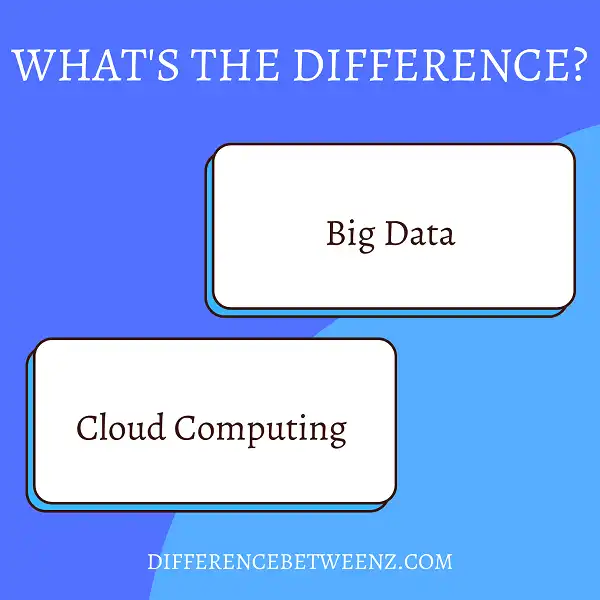There is a lot of confusion these days between the terms “big data” and “cloud computing.” While they are related, there are some distinct differences. In this blog post, we will explore those differences and help you understand which technology is right for your needs. So what exactly is the difference between big data and cloud computing? Let’s find out!
What is Big Data?
- Big Data is a term for the huge sets of data that are becoming increasingly available in today’s digitized world. This data comes from a variety of sources, including social media, sensors, and GPS devices.
- Big Data has the potential to transform businesses and organizations by providing insights that were previously unavailable. For example, Big Data can be used to improve marketing efforts, optimize supply chains, and personalize customer service.
- However, Big Data also poses some challenges, such as privacy concerns and the need for specialized skills to process and analyze the data. Nonetheless, Big Data is likely to have a big impact on the way we live and work in the years to come.
What is Cloud Computing?
- Cloud Computing is a term used to describe a variety of different computing concepts that involve a centralized data processing and storage system. In its simplest form, Cloud Computing can be thought of as a way to access information and applications over the internet instead of having them installed on your computer.
- This type of computing allows businesses and individuals to access software and data that would otherwise be stored locally on their own devices. Cloud Computing has grown in popularity in recent years as organizations have become increasingly reliant on data and applications that are hosted remotely.
- The benefits of Cloud Computing include increased flexibility, scalability, and efficiency. However, there are also some potential drawbacks, such as security concerns and data breaches. As organizations continue to increasingly embrace Cloud Computing, it is important to weigh the pros and cons carefully before making the decision to move to the cloud.
Difference between Big Data and Cloud Computing
Big data is a term that refers to the massive volume of data that businesses and organizations generate every day. This data can come from a variety of sources, including social media, transactional records, and weather patterns.
- Cloud computing is a term that refers to the use of remote servers to store, manage, and process data. In many cases, cloud computing refers to the use of public clouds, which are owned and operated by third-party companies.
- However, some organizations choose to use private clouds, which are owned and operated internally. There are several key differences between big data and cloud computing.
- First, big data generally refers to unstructured data, while cloud computing typically involves structured data. Second, big data is often stored on-premises, while cloud computing typically relies on remote servers.
Finally, big data analytics often requires specialized hardware and software, while cloud computing can be done using off-the-shelf tools. As a result of these differences, big data and cloud computing each offer unique advantages and disadvantages for businesses and organizations.
Conclusion
It’s clear that big data and cloud computing are both important aspects of business in the modern age, but there is a lot of ambiguity surrounding the two. We hope this article has helped to clear some things up for you and given you a better understanding of the difference between big data and cloud computing.


